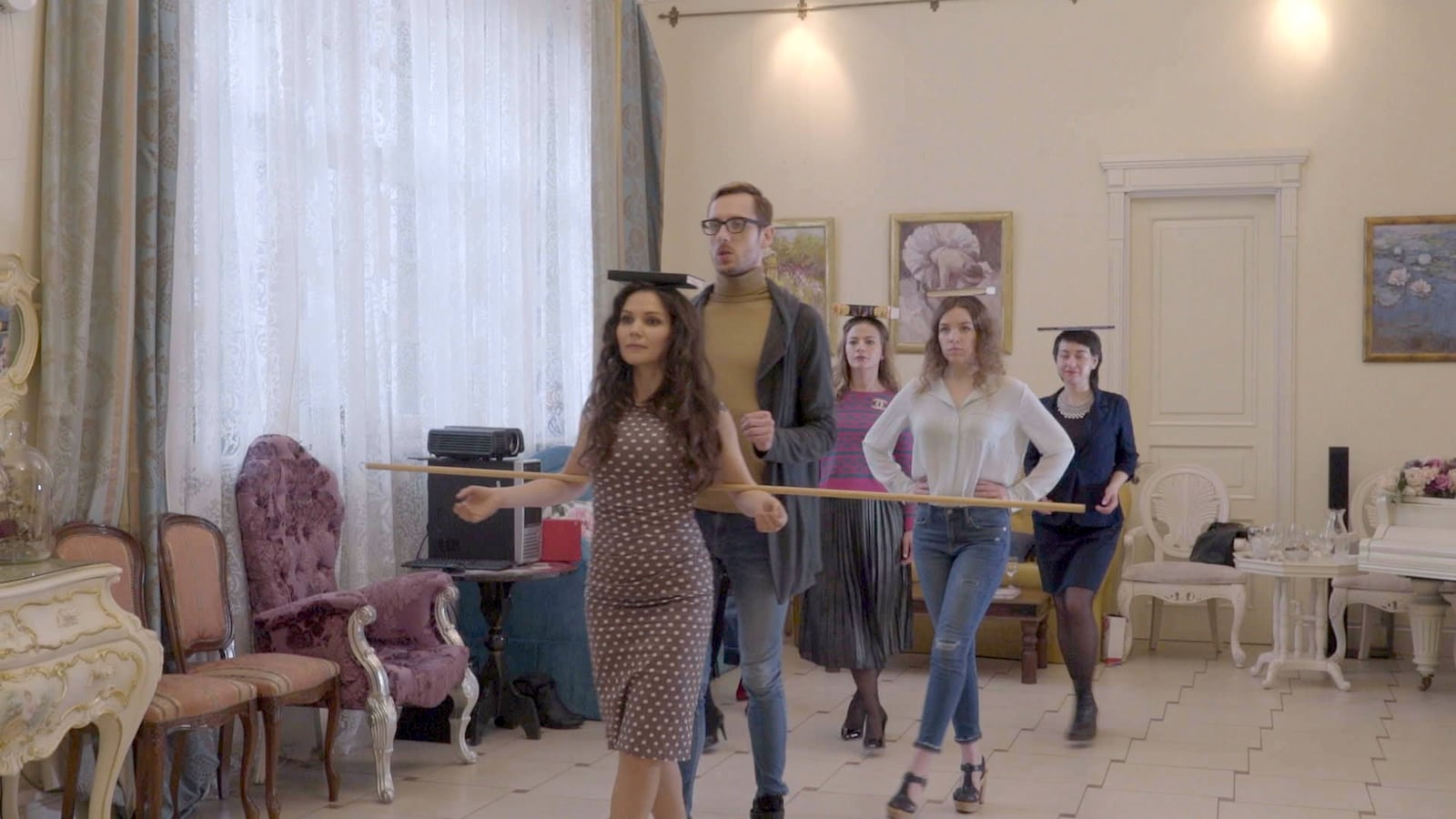According to School of Seduction, working-class women have few options in patriarchal Russia, and all of them involve finding a man. To aid young ladies in that quest, there are seduction schools where they can learn the timeless art of bumping, grinding and butt-wiggling their way into a prospective partner’s heart and pants—in particular, the pocket where he keeps his wallet.
Focused on a trio of women navigating this warped and sexist landscape, Alina Rudnitskaya’s documentary (premiering on Nov. 9 at the DOC NYC festival) is an eye-opening snapshot of gender dynamics in modern Russia. Praised by President Vladimir Putin as a place where “a man is a man and a woman is a woman,” it’s a country that instills in its female population the belief that independence is a pathway to ostracization and sorrow, and that marriage and parenthood is the primary means by which happiness can be attained. As a result, there can be no greater aim than to land a man willing to put a literal ring on it—regardless of whether love is also part of the matrimonial package.
That’s where the schools of seduction come in. In crowded classrooms, scores of women dressed in underwear and revealing outfits follow the instructions of a middle-aged male teacher who guides them through exercises in which they must bend over a chair in order to receive some rear-end grinding, wiggle their asses in the air, and participate in dance routines where they’re grabbed by the neck and thrashed about, crotch-to-crotch, in a display of intense macho attention (the more violent, the more genuine, apparently). The overarching lesson is clear: self-worth only comes from the interest of a man, and women should use whatever sexual tools they have at their disposal to catch one. With a shamelessness that’s almost as startling as its chauvinism, the program strives to turn women into veritable Venus flytraps.
The first of Rudnitskaya’s subjects, Lida, isn’t especially gung ho about the shady methods promoted by the School of Seduction. However, stuck living with a mother she can’t stand, and mired in a relationship with a married man, Sergei, who’s initially unwilling to leave his wife for her, she has few alternatives. Lida blames her problems on the fact that she “never had an example of a good family.” Still, TV and radio broadcasts that play intermittently throughout School of Seduction—providing macro context for the micro action at hand—suggest that the root cause of her predicament is the widely disseminated and accepted notion that women aren’t whole unless they’re the subservient half of a marital couple. That concept is backed by the school itself, where Lida nods in agreement as her teacher states that men want women to have brains in a business context but in other things, “no one needs them.”
Lida’s subsequent marriage to Sergei and—four years later—dreary housewife existence with a daughter proves the lie that domesticity guarantees bliss. On the contrary, Rudnitskaya’s clear-eyed vérité gaze reveals that, in these circumstances, it just brings about marginalization (once a professional, Lida now cooks and cleans), victimization (she suspects Sergei is cheating on her), and crushing displeasure. Unhappiness similarly plagues Vika, a student trapped in a loveless union with husband Denis, with whom she’s opened a lingerie shop. Vika admits to her therapist that she wants to leave Denis but fears being lonely and scorned by her peers. Meanwhile, she only feels truly alive (and on “fire!”) when partaking in hypersexualized dance classes at the school.
Economics play a significant factor in both Lida and Vika’s cases. Aware that they can’t earn as much as their male counterparts, and endlessly told that marriage is the end “goal” (as Vika’s mom outright states to her), Russian women are socially conditioned to feel bad for having independent desires—even though marriage itself, forged out of convenience and necessity more than love, is often a one-way ticket to regret, resentment and despair. Images of Lida’s daughter prancing around in her mother’s high heels underline the inherited corrosiveness of such an ideology, where sexual attractiveness is celebrated above all other qualities, because it’s what allows women to conform to their prescribed (if frequently unrewarding) role as dutiful wives and mothers.
School of Seduction most strikingly addresses the consequences of Russia’s misogyny via Diana, a young single mother introduced being chastised by Vika for her schoolgirl outfit and blonde pigtails (which Vika says would, if she wore it, make her “feel like a prostitute”). While that dig may be unduly nasty, there’s some truth to the idea that Diana—and those like her—are intent on selling themselves as sexual objects in direct exchange for financial support. Diana is depicted turning down a boyfriend because he can’t offer her the apartment and money she bluntly claims she requires. And she eventually marries an author who gives her those very things, and yet still fails to satisfy her, as illustrated by her attempt, six years later at a gala ball, to accept a stranger’s offer to take her on vacation sans husband.
In late scenes of Diana attending an etiquette school where she dresses in regal gowns and performs a scene from the Nicole Kidman-headlined Grace of Monaco, Rudnitskaya’s film provides a candid view of the brainwashing that’s been perpetrated against these women, all of whom have been led to believe that they can achieve their “fairy tale” by becoming appealing enough to nab a suitor. School of Seduction incisively exposes that idea as a carefully-constructed trap designed to keep them in their place as material “decorations,” striving for emotional fulfillment they can’t possibly attain, and then forced to settle for whatever affection and support they ultimately receive from their less-than-well-suited mates.
The fundamental futility of this paradigm is finally expressed by Diana’s son Sascha, who at film’s conclusion tells his mom that, no matter how hard she tries to be cheerily elegant, “your attitude changes” when the camera is off and no one is looking. In Russia, women may be trained to think that securing lifelong joy comes from transforming themselves into sexual temptresses or majestic queens. Yet as School of Seduction illustrates, both reductive guises only lead, in the end, to the same old everyday misery.


